Over the past decade, Hollywood and streaming platforms have taken video game adaptations seriously. The biggest AAA franchises—from fantasy and action to platformers—are leaping from computer screens to cinemas and TV series. Some adaptations smash box-office and viewership records, proving films and shows based on games can succeed. Others stumble, disappointing fans and critics. We’ve compiled a large yet easy-to-navigate guide to key films, series, and animation. You might discover something new here.
If we missed anything, we’ll gladly update the article with your help! Leave a comment.
Films (live-action)
The Super Mario Bros. Movie
Game: 1985 • Film: 2023
Audience reception: sky-high box office (~$1.36B worldwide); audiences love the bright fan service and brisk pacing, while critics found the plot thin. A warm family crowd-pleaser.
Co-produced by Illumination and Nintendo, the film leans into bright toy-box visuals and brisk, gag-driven set pieces. Jack Black’s Bowser (and the viral “Peaches”) gave the villain unexpected meme power.
Sonic the Hedgehog 1–2
Game: 1991 • Films: 2020, 2022
Audience reception: durable hit (sequel ~$405M)—a bouncy family actioner powered by Jim Carrey’s charisma and lively momentum. Formulaic? Sure. Fun? Absolutely.
The team famously redesigned Sonic after an early backlash, which flipped sentiment and helped the franchise take off. The sequel widens the sandbox with Tails and Knuckles (Idris Elba), turning it into a Saturday-morning crowd-pleaser with blockbuster polish.
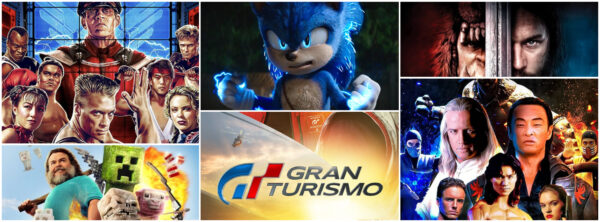
Five Nights at Freddy’s
Game: 2014 • Film: 2023
Audience reception: massive fan turnout and record hybrid debut; critics were harsher on the script. Atmosphere, practical animatronics, and fandom energy carry the show.
Blumhouse used full-scale animatronics (via Jim Henson’s Creature Shop) so the monsters feel weighty and tactile on camera. The day-and-date release on Peacock became a talking point—and didn’t stop it from packing theaters with fans.
Uncharted
Game: 2007 • Film: 2022
Audience reception: sturdy adventure hit (~$407M): roller-coaster set pieces and breezy tone; gripes about lore tweaks and character chemistry.
Tom Holland and Mark Wahlberg play it as a breezy buddy caper, with the cargo-plane sequence tipping its hat to Uncharted 3. It’s less about rewriting the treasure-hunt rulebook than about delivering glossy, globe-trotting fun.
Gran Turismo
Game: 1997 • Film: 2023
Audience reception: “bio-pic on nitro”: predictable drama, but the racing and hardware thrill—over $120M, best enjoyed on a big screen.
Inspired by real driver Jann Mardenborough, Neill Blomkamp shoots racing like combat—cockpit rigs, low drones, and engine-level POVs. It’s predictable as drama, but the sensation of speed feels satisfyingly physical.
Need for Speed
Game: 1994 • Film: 2014
Audience reception: modest worldwide success (~$203M); strong visuals and stunts, story on rails.
Ex-stuntman director Scott Waugh insisted on practical car stunts, dialing back CG so crashes and drifts hit harder. The cross-country structure nods to old-school road-race movies with a modern muscle-car sheen.
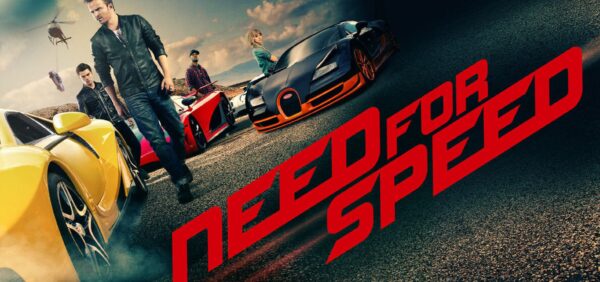
Resident Evil (film saga)
Game: 1996 • Films: 2002–2016; reboot 2021
Audience reception: one of the highest-grossing game franchises (> $1.2B combined): loved for pulsing action, dismissed for narrative shortcuts.
Paul W. S. Anderson and Milla Jovovich steered the series toward kinetic, bullet-time action-horror with increasingly bonkers escalations. The 2021 reboot Welcome to Raccoon City pivoted back to claustrophobic survival vibes and game-faithful locations.
Silent Hill
Game: 1999 • Film: 2006 (sequel 2012)
Audience reception: eerie sound and striking visuals; criticisms target the script. The first film retains cult status.
Director Christophe Gans borrows the franchise’s dream-logic and Akira Yamaoka’s soundscapes to build dread that creeps under the skin. The fog, sirens, and creature design (hello, Pyramid Head) are still the things fans talk about.
Mortal Kombat (1995) and Mortal Kombat (2021)
Game: 1992 • Films: 1995; 2021 (hybrid release)
Audience reception: the ’95 film is pure nostalgia; the reboot delivers flashy fights and a divisive story. Either way—“Finish him!” lands.
’95 locked in a generation with that thumping “Techno Syndrome” theme and PG-13 martial-arts spectacle. The 2021 reboot opens with a brutal Scorpion–Sub-Zero prologue and invents newcomer Cole Young to thread the lore.
Street Fighter
Game: 1987 • Film: 1994
Audience reception: about $99M and a “so bad it’s good” cult: bravado, memes, Jean-Claude Van Damme—perfect for late-night group viewing.
Jean-Claude Van Damme hams it up as Guile while the film leans full tilt into comic-book camp. Raul Julia’s operatic turn as M. Bison (his final role) gifted the movie a lifetime of quotable one-liners.
Warcraft
Game: 1994 / 2004 • Film: 2016
Audience reception: global hit (~$439M), especially outside the U.S.; fans embrace the lore, critics cite pacing and story issues.
Duncan Jones pushes performance capture so the orcs emote through heavy VFX rather than just snarl. Its colossal overseas haul—especially in China—quietly reset expectations for how game movies can travel.
Rampage
Game: 1986 • Film: 2018
Audience reception: straight-up monster romp with Dwayne Johnson (~$428M): spectacular if predictable.
Loosely riffing on the 1986 arcade game, it delivers three kaiju-class creatures wrecking major skylines. Dwayne Johnson’s buddy-monster chemistry with George adds a goofy heart to the demolition.
Monster Hunter
Game: 2004 • Film: 2020
Audience reception: pandemic-era numbers were small; monsters and weapons please fans—others, less so.
Anderson reunites with Jovovich for a lean, creature-feature loop of hunt-learn-upgrade, with Tony Jaa showcasing silky bow-blade choreography. Diablos bursting from the dunes is the film’s poster-shot payoff.
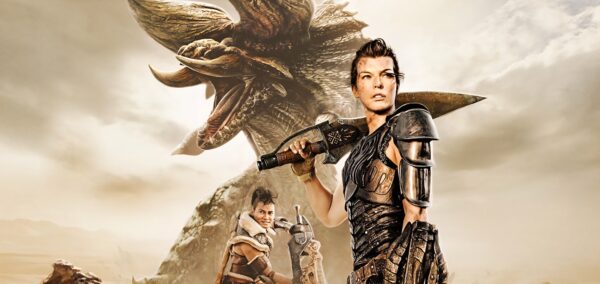
Pokémon Detective Pikachu
Game/series: 1996 / spin-off 2016 • Film: 2019
Audience reception: warm family “noir-lite” (~$433M); the simple mystery is forgiven for coziness and world-building.
Ryan Reynolds’ quippy Pikachu anchors a neon-noir Ryme City where Pokémon feel plausibly integrated into everyday life. The Mr. Mime interrogation and Bulbasaur forest sequence show how playful—and sweet—the film can be.
Borderlands
Game: 2009 • Film: 2024
Audience reception: starry packaging, weak box office and reviews; quips and action won’t save it for everyone.
Eli Roth leans into cel-shaded color and loud, snarky banter, aiming for a live-action comic panel come to life. Star casting (Cate Blanchett, Kevin Hart, Jack Black) drew curiosity even as the tone split audiences.
A Minecraft Movie
Game: 2011 • Film: 2025
Audience reception: record global opening (~$301M) with polarized reviews: fandom louder than critics; family vibe helps.
A live-action riff on block physics means sight gags with crafting, mobs, and impossible geometry baked into the set pieces. The family-adventure framing keeps the charm accessible even if reviews diverge.
Series (live-action)
The Last of Us (HBO)
Game: 2013 • Series: 2023–present
Audience reception: rare near-unanimity—big premiere, bigger finale, goosebumps and tears. Proof a careful adaptation can become prestige drama.
Showrunners Craig Mazin and Neil Druckmann brought over not only the plot but the “grain” of relationships—from sweeping drama to quiet domestic beats. “Long, Long Time” became a pop-culture event, and the clickers terrify thanks to the performers’ physicality plus the sound design and Gustavo Santaolalla’s score.

Fallout (Prime Video)
Game: 1997 • Series: 2024–present
Audience reception: streaming juggernaut—retro-future style, black humor, charismatic leads, and endlessly memable wasteland energy.
The show laughs and frowns at once: grotesque Vault-Tec retrofuturism sits beside very human stories for Lucy, the Ghoul, and Maximus. Props—from the Pip-Boy to crates of Nuka-Cola—do heavy worldbuilding, while Walton Goggins’ Ghoul gives the series its unmistakable sweet-and-sour edge.
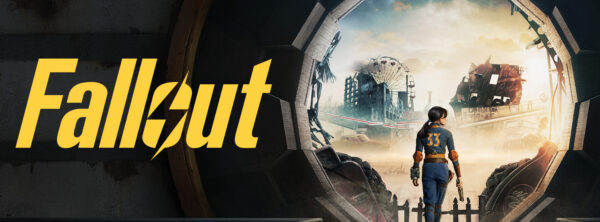
Halo (Paramount+)
Game: 2001 • Series: 2022–2024
Audience reception: S1 split the fandom; S2 tightened action and structure. Lore interpretation debates never end.
Debates over Master Chief’s helmet/no-helmet never stop, but season two adds coherence and drive—from ground firefights to space dogfights. The heavy Mjolnir suits and hand-to-hand choreography make the action tactile, and the Chief–Cortana dynamic finally lands emotionally.
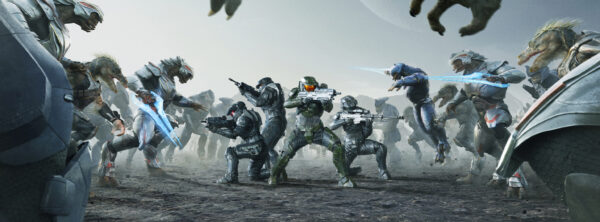
Twisted Metal (Peacock)
Game: 1995 • Series: 2023–present
Audience reception: unexpectedly bingeable trash-action road movie: high audience scores, breezy tone, brisk tempo.
Half-hour episodes sprint like a ’90s mixtape: lots of jokes, lots of asphalt, a dash of bloody mayhem. Sweet Tooth speaks with Will Arnett’s voice while wrestler Samoa Joe provides the body—a pairing that turns the clown into a charismatic chaos protagonist.
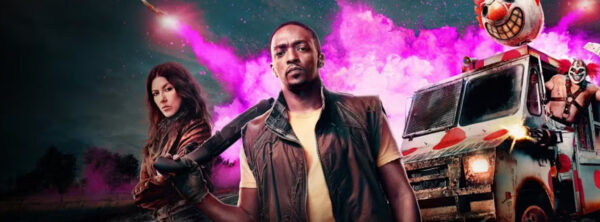
Like a Dragon: Yakuza (Prime Video) — adaptation of Yakuza/Like a Dragon
Game: 2005 (Yakuza / Ryū ga Gotoku) • Series: late October 2024
Audience reception: stylish crime drama in Kamurocho: six episodes rolled out in two batches. More serious than the games yet faithful to Kiryu’s code-of-honor spirit.
The series lovingly rebuilds Kamurocho—neon arches, karaoke, narrow backstreets—and stages brawls in true heat-action style: shattering shop windows, tossing furniture, emphatic finishers. Kiryu is drawn as a blend of stern honor and quiet melancholy, so the crime saga reads not just with fists, but with heart.

Animation & Anime
Arcane (League of Legends)
Game: 2009 • Series: 2021–
Audience reception: a visual breakthrough with zero entry barrier for non-players—nearly a gold standard of lore-first adaptations.
Made by Fortiche—a 2D/3D hybrid with a “medieval-industrial” painterly look that makes frames feel like living illustrations. The story of sisters Vi and Jinx plays on the contrast between gilded Piltover and the undercity Zaun, and it works even for newcomers thanks to clear drama, music, and rhythm.
Castlevania / Castlevania: Nocturne
Game: 1986 • Series: 2017–2021; 2023–
Audience reception: adult gothic, crisp fight choreography, careful myth-crafting.
Powerhouse Animation stages “whip versus vampire” as showy choreography with meaty impact animation. Nocturne shifts to the French Revolution, introduces Richter Belmont, and leans into free-will themes—without losing the bloody gothic romance.
Cyberpunk: Edgerunners
Game: 2020 • Anime: 2022
Audience reception: “anime of the year” for many—an emotional gut-punch that reignited interest in the game.
Studio Trigger’s signature charge—knife-cut edits, neon palette, unrestrained energy—turns the 10-episode run into a tragedy about dreams and the cost of upgrades. David–Lucy hit the heart, while the soundtrack and visuals reignited interest in Night City.
Devil May Cry — anime (2007)
Game: 2001 • Series: 2007 (Madhouse, 12 eps)
Audience reception: stylish noir-action for Dante fans; some filler episodes, but the era’s vibe lands.
A noir “case-of-the-week”: red-coated Dante takes odd jobs, jokes about debts and pizza, and “Ebony & Ivory” sing in a choir of gunshots. Madhouse’s style gives the lone hero a dark sheen and weary charisma even when the plot drifts into filler.
Devil May Cry — new series (Netflix, 2025)
Game: 2001 • Series: 2025 (Studio Mir, 8 eps)
Audience reception: loud spring debut: recognizable 2000s style, punchy fights, predictable canon debates—exactly what a hot IP invites.
Studio Mir fuses blade and pistols into readable action with clean silhouettes and punchy animation. It plays on 2000s nostalgia but serves it modern—tight fight staging, a wink of humor, and hints at a long-game demon-hunter family drama.
NieR:Automata Ver1.1a
Game: 2017 • Anime: 2023–2024
Audience reception: sensitive stylization and music; production pauses and compressed routes were debated, but overall warmth and respect for Yoko Taro’s ideas.
The “Ver1.1a” label fairly warns: canon is shifted, spirit preserved—philosophical lines and melancholy sit beside 2B and 9S’s battle dances. Production pauses became a “ritual of waiting,” and UI/pod visual gags add a light authorial touch.
Dragon Quest: Your Story (film)
Game: 1992 (Dragon Quest V) • Film: 2019
Audience reception: a bold final twist split Japanese audiences; abroad it plays as cozy fantasy on Netflix.
A full-CG take that reimagines DQ V’s hero’s journey and rings with familiar fanfares—those orchestral themes snap you back to childhood. The final meta-twist split fans: a love letter to the player for some, too abrupt an experiment for others.
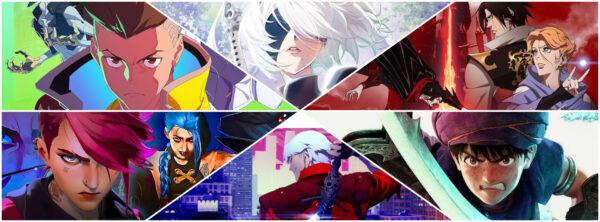
Less-known but intriguing adaptations (quick picks)
- Max Payne — Game: 2001 • Film: 2008 → ~$86–88M; critics panned the muddled plot, viewers enjoyed bullet-time and the noir mood.
- Hitman — Game: 2000 • Film: 2007 → commercially fine (~$101M) but “off-DNA”; reboot Hitman: Agent 47 (2015) did ~$82M and faded fast.
- Ratchet & Clank — Game: 2002 • Animated film: 2016 → rare PlayStation miss (~$14.4M) though the world’s plasticity charms.
- Doom — Game: 1993 • Film: 2005 → ~$58.7M and rough reviews, but the one-take FPS scene is catnip for fans.
- DOA: Dead or Alive — Game: 1996 • Film: 2006 → ~$7.5M; Corey Yuen’s fight craft pops, the movie is an acquired taste.
- Wing Commander — Game: 1990 • Film: 1999 → ~$11.6M; interestingly, game creator Chris Roberts directed.
- Double Dragon — Game: 1987 • Film: 1994 → ~$2.34M worldwide: a legendary so bad it’s good cyber-brawler of the ’90s—nostalgia beats logic.
- The King of Fighters — Game: 1994 • Film: 2010 (limited/VOD) → symbolic box office, a cult guilty pleasure for a niche crowd.
- In the Name of the King: A Dungeon Siege Tale — Game: 2002 • Film: 2007/08 → ~$13.1M; Uwe Boll’s lavish fantasy with a surprisingly starry cast.
- House of the Dead / BloodRayne / Far Cry — Games: 1996/2002/2004 • Films: 2003/2005/2008 → uneven yet illustrative early stabs at the genre.
- Werewolves Within — Game (VR): 2016 • Film: 2021 → tiny gross but one of the best-reviewed game films (RT ≈ 86%).
- Ace Attorney (Takashi Miike) — Game: 2001 • Film: 2012 → stylish, comics-inflected, extremely Japanese in the best way.
- Like a Dragon (Yakuza) — Game: 2005 • Film: 2007 → manic pace, gleeful humor, and a near-literal transfer of the series’ spirit.
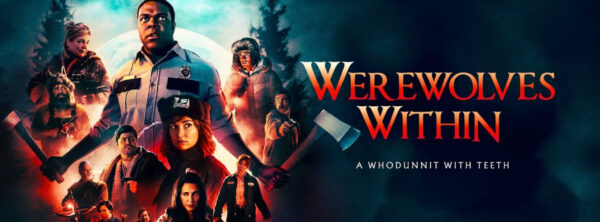
Box-office success more often goes to family brands and recognizable icons (Mario, Pikachu, Sonic), while darker, more hardcore universes fare better as series (The Last of Us, Fallout).
Critically, scripts remain vulnerable when a film tries to “package” complex game structures (Assassin’s Creed, Warcraft, Borderlands). Audiences, however, tend to forgive story flaws if there’s strong fan service, worldbuilding, and spectacle (Uncharted, FNAF).
Animation and anime have become the “golden middle” between lore fidelity and mass appeal: Arcane and Edgerunners are already benchmarks, while NieR and the new Devil May Cry reinforce the trend of canon-aware, thoughtfully reinterpreted adaptations.
Which adaptations have you watched, and what did you like or dislike? Did you find anything new here that piqued your interest and you’re planning to watch?

 Konsoles
Konsoles Priekšpasūtījumi
Priekšpasūtījumi PlayStation 5
PlayStation 5 Xbox
Xbox TCG
TCG Lietotas preces
Lietotas preces


 Mobilie telefoni
Mobilie telefoni Apple
Apple Samsung
Samsung Xiaomi
Xiaomi Planšetdatori
Planšetdatori E-lasītāji
E-lasītāji Aksesuāri
Aksesuāri




